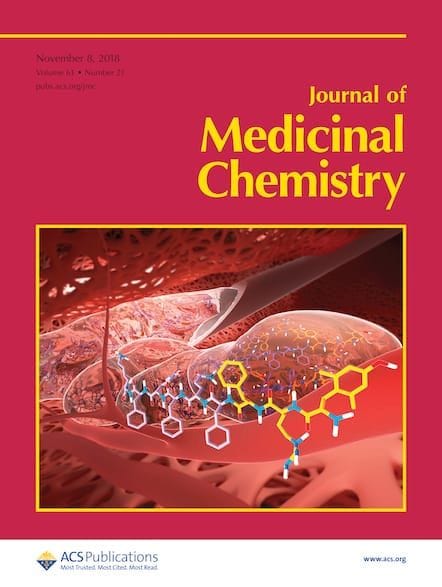ACS Publications is pleased to announce that Craig W. Lindsley, Ph.D., has been named as Editor-in-Chief (EIC) of the Journal of Medicinal Chemistry. His term is set to begin on January 1, 2021. Lindsley is the William K. Warren, Jr., chair in medicine at Vanderbilt University. There, he is a University Professor of Pharmacology, Biochemistry, and […]

His research group focuses on drug discovery, medicinal chemistry, and synthetic organic chemistry. Lindsley received his Ph.D. from the University of California, Santa Barbara. He was the founding EIC of ACS Chemical Neuroscience and is the interim EIC of ACS Pharmacology & Translational Science. A search for permanent editors-in-chief for those journals is underway now.
I recently sat down with Professor Lindsley to learn about his plans for the Journal of Medicinal Chemistry. Read the interview below.
What are your goals as Editor-in-Chief?
I was thrilled beyond belief at being named the EIC of JMC – I looked up to Philip S. Portoghese (EIC of JMC for over 40 years!) since I was a graduate student, and to now have his former role may be the height of my professional career. The Journal of Medicinal Chemistry plays a critical role in not only disseminating the most important advances in small molecule drug discovery, but also in providing content that trains current and future generations of medicinal chemists – it all starts with JMC, and that legacy of impact will be retained and expanded.
My vision for the Journal of Medicinal Chemistry involves expanding the editorial board (geographic, ethnic, and gender balance along with establishing an Early Career Board), increasing author satisfaction, increasing and creating new non-peer-reviewed (citable) front matter content, increasing submissions, and expanding journal content to encompass more pharmacokinetics (DMPK) science and emerging areas within medicinal chemistry and drug discovery. JMC is the most trusted and cited medicinal chemistry journal in the world, and my highest priority is to preserve the legacy of JMC, while further expanding its scope, authorship, and impact.
Beyond this, my goals are to create an Early Career Board, build an editorial board that partners with authors to see their work published quickly (yet with high standards), build bridges to medicinal chemists in Europe, Asia, and India, and streamline the submission process and speed of publication.
Immediate plans center on revising/streamlining the Author Guidelines, expanding the EAB and adding new AEs (geographic, ethnic, and gender balance, along with establishing an Early Career Board), and actively soliciting authors and new content. Engaging all forms of social media will start immediately, and I hope to add a significant diversity of contributions in new front matter. I want JMC to be the first choice for authors to publish their medicinal chemistry research, and to enjoy the experience of publishing with JMC. Over the longer-term, I would like to see new authors find a home at JMC, active engagement by the Early Career Board, and despite Plan S, increased submissions from medicinal chemists in Europe and other underrepresented areas. To propel the Journal of Medicinal Chemistry to further expand its influence and impact in medicinal chemistry and drug discovery, I plan to increase JMC visibility, actively solicit content globally and embrace the next generation of medicinal chemists across gender and ethnic lines.
What do you see as the biggest challenges and opportunities in the field today?
The biggest challenges still reside with delivering clinical candidates rapidly, and with properties/profiles that enabled successful transition into patients – here as well, preclinical animal models still lack predictive validity in human disease. Many of the newer classes of therapeutic targets bring new structure-activity relationships and drug metabolism and DMPK challenges, and the strategies for successful engagement are just now appearing in JMC. Another issue is IP space and the need for fundamentally new heterocycles and other chemotypes to secure IP; however, these may also bring new DMPK challenges.
Why should people outside the field take an interest in JMC? How does it affect people’s lives?
Everyone engaged in discovery and target validation should read JMC – biological and genetic proof of concept is great, but it always needs to be recapitulated with a small molecule. Perspectives are a great venue to learn everything about a given area, and always include multiple ‘teaching moments’.
Especially in light of a pandemic like Covid-19, JMC captures the latest advances and new therapeutic modalities being advanced to combat the global threat.
How do you see the journal and the community working together to address those challenges and seize those opportunities?
I see more engagement by pharmacologists/biochemists and virologists with medicinal chemists moving forward to move ‘in-step’ and advance fundamental new treatments. Moving forward, I would like to see more cross-over special issues with other journals within the ACS biological portfolio to raise awareness across disciplines.
Where do you want JMC to expand?
Over the longer-term, I would like to see new authors find a home at JMC, active engagement by the Early Career Board, and despite Plan S, increased submissions from medicinal chemists in Europe and other geographic areas. I’d also like to see more engagement and submissions from medicinal chemists engaged with endemic diseases, as these still have a significant global health impact.
